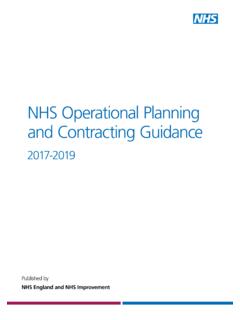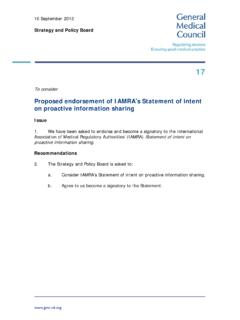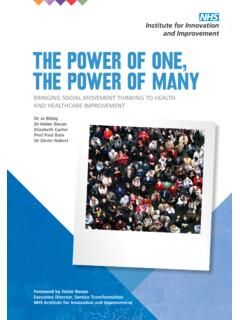Transcription of A Handy Guide to Facilitation - NHS England
1 Institute for Innovationand ImprovementA Handy Guide to Facilitation23 ContentsPage01 Introduction to your Handy Guide to Facilitation ..402 What is Facilitation and how can it help with improvement work? ..803 Preparing for your role as a facilitator ..2004 Facilitating a workshop or group meeting ..3605 Facilitation activities ..4806 Your questions answered .. to your Handy Guide to Facilitation15 IntroductionIf you are involved in improvement work, you may at some point be asked to facilitate a group meeting or workshop to discuss how to improve services for patients. If you are new to this sort of work, you may well have all sorts of questions about how to make these group sessions as productive as possible. This Guide is designed to give you the know-how and confidence to effectively facilitate workshops and group meetings. You will find lots of things to consider and practical tips, including: advice to help you prepare for your role as a facilitator tools and techniques to choose from according to how you want to run your workshop or you work your way through this Guide , think about your role, the work of the group you are facilitating and your relationship with the people in that group.
2 Ask yourself: Are you clear about the anticipated outcomes and specifi c questions on which the group will focus? Who are you linking with for this improvement work? Is the work of the group part of an organisational or national initiative? Are you normally part of the group and knowthe individuals and their work really well or are you to be an external facilitator? Are you the group leader? If not what is your relationship with the person who leads the group you are going to work with? Do you need to engage others beforehand who will help strengthen your relationship with the group?Handyhint forUSING THIS GUIDEA Handy Guide to is facilitationand how can it help with improvement work?29 What is Facilitation and how can it help with improvement work? Facilitation is the art and science of helping groups in their thinking, planning and decision-making. Bringing this level of clarity to group discussions about service improvement can have a signifi cant impact on the quality of services provided to patients.
3 2910 Understanding the impact of effective group workWe are all involved in group meetings and have been since we were very young. Think about the groups you were involved in as a child - the brownies, the scouts, your gang of friends or the youth club. What made you want to go back and continue being part of the group or did you leave after just a few meetings? Now think of different group meetings at work. Did you feel bored or excited about what was being discussed? Did you feel involved or left out? Think of the people who led these groups. Did you like them? Did they make you feel important? Did you feel they were in control ?A Handy Guide to Facilitation1111 What is Facilitation and how can it help with improvement work?TaskThink of two groups you have been involved in, one that you enjoyed and one you did not. Make notes about your experiences. It doesn t matter if it was a work group or a social group you enjoyedA group you didn t enjoyWhat made you enjoy it?
4 What made you not enjoy it?Think of two groups you have been involved in, one that you 1212 Research into the characteristics of effective groups has identifi ed a number of qualities. Check these against your own an effective group: The task, objective or the reason for people to meet is well understood by everyone. The atmosphere of the group tends to be informal, comfortable and relaxed. There is much discussion in which everyone participates. Everyone listens to each other. People are free to express their feelings as well as their ideas. Disagreement and criticism is frequent and frank but the group is comfortable with this and shows no signs of avoiding the confl ict. Decisions are reached by a consensus in which it is clear that everyone is in general agreement. When action is taken, clear assignments are made and accepted. The leader of the group does not dominate but is in contrast, group work that doesn t work well will: Be dominated by a few individuals and their perspectives.
5 Never hear the ideas and comments from the quiet members. Take too long to get to the real agenda. Have no clear objectives. Have no follow-up Handy Guide to Facilitation13 What is Facilitation and how can it help with improvement work?Be clear about: Goals are they the same for everyone? Roles what do you want people to do? Procedure how are things going to happen?Ask yourself: Are everyone s expectations the same?Remember that: As a facilitator, you are not chairing a meeting or debate. Facilitation is not about offering counselling or group therapy. Your role as a facilitator is not as teacher or forEFFECTIVE FACILITATION14 Getting the balance rightTo ensure your role as facilitator is as successful as it can be, you should consider the type of group meeting you are planning and what you want to achieve from it. Think about: Formality do you need a formal group to accomplish a specifi c task or an informal group that is more spontaneous and evolving?
6 Climate how close and friendly or casual should the group interaction be? Participation what should the interaction be like? How much and what type of engagement do you want? Confl ict How will you deal with confl ict and disagreements? Decision-making how will decisions be made and by whom? Responsibilities how will tasks be assigned and sub-groups formed? Communication what channels are preferred and how is the group networked? Do they prefer face-to-face meetings, phone calls or email? Evaluation how will progress be monitored, checked and evaluated? How will feedback be provided?A Handy Guide to Facilitation15To be an effective facilitator, you need to match: individual preference and group experience the purpose or task with the process of engagement and your own skills and experience with the design of the meeting. Handyhint forEFFECTIVE FACILITATIONWhat is Facilitation and how can it help with improvement work?
7 Adapted from Tuckman and Jenson (1977)FormingStormingNormingPerformingAd journingStages of group developmentUnderstanding the group you are working withWhatever the group and for whatever length of time it is planning to work together, you need to be aware that groups usually go through a series of stages before becoming truly is not a simple linear process and new people joining may cause the group to go back to the stages of group development explainedFormingEffort at this stage is spent on defi ning goals. At this stage individuals may be confused as to why they are in the group and be trying to size up the personal benefi ts relative to the personal costs of being involved. They may be keeping their feelings to is the stage when team members test each other. They question values, behaviours, tasks and relative priorities of the goals, as well as who is to be responsible for what.
8 There may also be questioning of the guidance and direction of the leader and some members may withdraw and isolate themselves either from the emotional tension or because they recognise that their values, beliefs and skills don t fi t. If the storming is not allowed to happen, the team may never perform well. It is a healthy process in which a team evolves with a common set of values, beliefs and is when behaviour progressively develops into an acceptance of differences of opinion and the ground rules and decision-making processes are accepted. This is the time when individuals in the group value the difference that others bring. A Handy Guide to Facilitation17 PerformingDuring this stage, the group effectively and effi ciently works together and towards the goals. The group and individuals learn and develop together. You could describe this stage as less me, more we! AdjourningThis is the end of the working life of the group.
9 Some groups such as improvement project teams are created to work with specifi c problems for a set time six months or a year. They should havea well-defi ned and managed ending where group members know what to expect and are helped to deal with it and move on. Sometimesmembers feel sad, nostalgic and mourn the end of the is Facilitation and how can it help with improvement work?18 Take a moment to consider what you have read in the Guide so far. Ask yourself which of the following outcomes could be considered a good group experience:OutcomeGood group experience?(circle as appropriate)The objectives have been metYes / NoThe objectives have been met but every individual felt railroaded and threatenedYes / NoThe objectives have not been metYes / NoThe objectives have not been met but individuals had a better understanding of themselves, each other and the problemYes / NoPauseand refl ectA Handy Guide to Facilitation19 What is Facilitation and how can it help with improvement work?
10 202003 Preparing for your role as a facilitator321 Preparing for your role as a facilitatorThere is a growing awareness that groups, when well managed, can unleash an incredible enthusiasm for doing things better and differently. Facilitation plays an important role in helping groups to work effectively and also, therefore, in bringing about improvements in healthcare. 32122 Facilitation requires: an environment of mutual trust the ability to generate a sharing environment a willingness to listen a desire to seek understanding the ability to be diverse and fl exible the ability to challenge yet stay supportive the ability to work with people from a wide range of backgrounds and a toolkit of styles, approaches and techniques. To be effective as a facilitator, you should help the group you are working with get further, faster and in a more focused way than they would alone and help them have some fun along the way!












